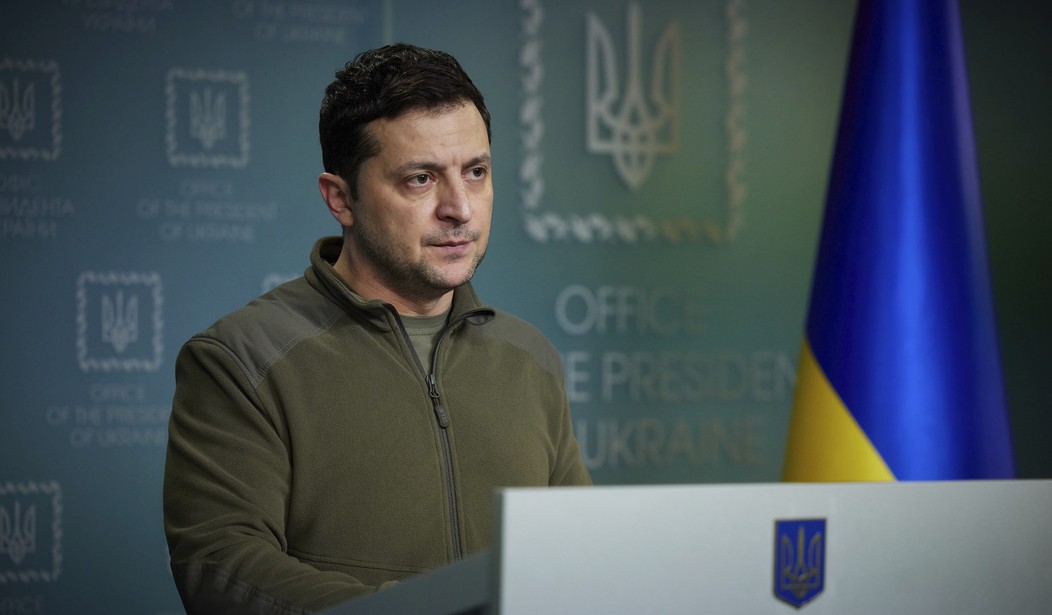When foreign dignitaries hop on a plane and make the obligatory trip to Kyiv to assure Zelensky of their endless adoration and perpetual support, he generally expects to be showered with praise and cash. (Much less cash from the Europeans, but the principle is the same.) But Zelensky was in for a bit of a surprise when he was visited by German Foreign Minister Annalena Baerbock today. To be sure, she was there to reassure Ukraine of Germany’s continued support, but she also took time out to note that the Ukrainian government “still has a way to go” when it comes to enacting and enforcing “anti-oligarch laws” and fighting corruption. That probably wasn’t the message that Zelensky was hoping to hear. But Baerbock followed that up with assurances that Ukraine would continue to receive Germany’s support anyway in multiple forms, including an endorsement of their bid to join the EU. (Politico)
German Foreign Minister Annalena Baerbock on Monday called on Ukraine to step up its efforts to fight corruption during a surprise visit to Kyiv.
Ukraine “still [has] a way to go in the implementation of the anti-oligarch law and the fight against corruption,” Baerbock said on arrival in the Ukrainian capital, the German foreign ministry said in a statement.
The German minister praised Kyiv’s “impressive” progress on judicial reforms and media legislation — completed even as Ukraine has spent the last 18 months fending off Russian President Vladimir Putin’s full-scale invasion, which has cost thousands of lives. Baerbock also reassured Kyiv that it would get Berlin’s “decisive support” for its European Union bid.
Zelensky’s government may or may not have made “significant progress” in eliminating corruption inside of his government. The point is that Baerbock was almost certainly understating the case. As we recently discussed, even the New York Times was forced to admit this month that the Government in Kyiv is still rife with corruption. How they’re going to pass and enforce a new “anti-oligarch law” is something of a mystery when you consider how much the oligarchs still control that country.
They’ve had such a law in place since 2021. If you wind up on the dreaded “register of oligarchs” you are not allowed to finance political parties. You are also barred from participating in the privatization of companies and you are supposed to submit reports about your wealth and income to the government. But just as in the United States, there are ways to get around rules like those and people with enough power and influence generally find a way to do so.
Leaving aside for the moment the question of Germany’s financial support of Ukraine (and the rest of Europe, for that matter), let’s take a look at the other promise that Baerbock made to Zelensky during her visit. She promised that Ukraine would have Germany’s “decisive support” in its bid to join the European Union. But when would she anticipate that happening?
It can’t be very soon, at least not in the real world, and the reason has nothing to do with corruption. In case she hadn’t noticed, Ukraine is in the middle of a war with a nuclear power. Much like NATO, the EU has a mutual defense clause in its charter. It states that if any member of the EU is the victim of “armed aggression on their territory” the other member states “have an obligation to aid and assist it by all the means in their power.” It goes on to emphasize that this obligation “is binding on all Member States.”
In other words, if Urkaine is admitted to the EU and another rocket lands anywhere else in the country, the rest of the EU is at war with Russia. That was the same snag that was holding up Ukrainian membership in NATO, though NATO was at least smart enough to specify that they wouldn’t accept new members who were actively engaged in a war already. Of course, this situation is precisely why Zelensky is so hopped up to join the EU as a second choice to NATO. He very much wants someone else to fight Russia for him, no matter how far the war escalates.
In terms of “having a way to go” in fighting corruption, it’s worth noting that Ukraine is still widely considered to be the second-most corrupt country in Europe, behind only Russia. There’s a bit of irony for you. The most corrupt country in Europe invades the second-most corrupt country and we’re left to fund the efforts of one of them along with most of the rest of Europe, though to a far lesser degree.
For a deeper analysis of the situation, take a look at this recent report from The Economist. They pose the question, “Is Ukraine really interested in fighting corruption?” They find that Zelensky has been making some of the right moves and removing a few of the seriously bad actors, particularly since the invasion began. But even if he were 100% committed to the proposition, he couldn’t possibly pull it off. If he removed everyone who has had their hands in the cookie jar, there would be virtually nobody left to run the government. And the people who were ejected would include a lot of Zelensky’s most powerful supporters. When an apple has been rotten for this long, you don’t restore it overnight with a couple of dabs of pest repellant. And yet we continue to send billions of dollars over there and the government refuses to conduct an audit of all the aid. Is it any wonder that support for the continued funding of this war has been plummeting?








